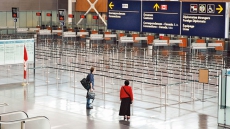Two separate reports being released Tuesday have used different strategies to reach the same conclusion — Canada's health care wait times leave much to be desired.
The Wait Time Alliance, a group consisting of major doctor's associations across the country, has analysed data from provincial health care ministries.
The Alliance says there's been some improvement in wait times for certain services like cardiac or radiation treatments, but many others are unacceptably high.
The Fraser Institute reached its conclusion by surveying 2,382 medical specialists across the country to determine the length of time between when a patient is referred to them and when they receive treatment.
That survey pegs the median wait time is 18.3 weeks, nearly the same as the number reported last year and more than double the length of wait times in 1993.
Both surveys say Saskatchewan and Ontario offer the shortest wait times while patients languish longest in Atlantic Canada.
Both report authors agree that measuring wait times in Canada is a challenge complicated by a lack of universal standards across the country.
Alliance chair Dr. Chris Simpson said the data collected by provincial health ministries varies widely, since different regions and even individual hospitals track different numbers according to their own criteria.
No matter what figures are being presented, however, Simpson said the message is clear — the system as a whole needs to be fixed.
Delays in one area, he said, have immediate repercussions across the rest of the health care sector.
"We have now situations where patients flow from primary care to hospital to home care to long-term care," he said in a telephone interview. "And every time there's a wait for one of these components in the system, the rest of the system backs up."
Both reports suggest patients can expect an expedited timeline when seeking one of the five priority treatments flagged in the now lapsed 2004 health accord, a $41 billion funding agreement between the federal government and the provinces.
The alliance said wait times for hip and knee replacements, cataract surgeries, bypass surgeries, radiation therapy and diagnostic imaging have all improved since the accord was introduced.

The Fraser Institute survey found that radiation oncology and elective cardiovascular surgeries boast some of the shortest median wait times in the country at 4.1 weeks and 9.9 weeks respectively.
Both reports also agree that health care lag times are significantly shorter in Saskatchewan than anywhere else in the country, saying the province has adopted new measures in recent years that have brought about a remarkable turnaround.
Fraser Institute senior economist and report author Bacchus Barua said wait times in the province have more than halved since 2011 when median times stood at 29 weeks. The 2015 figure stands at 13.6 weeks, he said, crediting Saskatchewan's willingness to partner with private medical providers and set up a pooled referral system that matches patients with the physician that has the shortest waiting list.
Such "outside the box" thinking, he said, is common among countries such as Germany and Switzerland whose universal health care systems offer shorter turnaround times than those found in Canada.
He said such systems all feature private sector partnerships and cost-sharing arrangements to keep the patient cue moving.
Canada could be well-served by similar strategies, he said, adding that addressing inefficiencies in the current system would do more good than increasing health care spending.
The Fraser Institute is a think tank whose stated mission is to study "government actions in areas that deeply affect Canadians' quality of life."
Simpson said the federal government has an opportunity to take leadership on the issue as part of its stated pledge to negotiate a new health accord.
Some of those terms would apply to Ottawa itself, since the federal government is directly responsible for the medical needs of prison inmates, veterans and First Nations Canadians.
He said setting criteria to standardize the numbers tracked by the country's 14 health care systems would go a long way to highlighting problem areas and identifying ways to fix them.
"Public reporting of data, I think, is so healthy for a system that wants to improve, because when the public truly understand what kind of value they're getting from their tax investment and what kind of service is being delivered, they will put on the political pressure that politicians will listen to," he said.

Barua took a harder line, saying data analysis can only go so far if Canada doesn't implement policy changes as well.
"Wait times are not simply going to get fixed by provinces measuring them. We're already doing that, and it doesn't matter which report you see, pretty much all of them are showing that wait times are too long."





